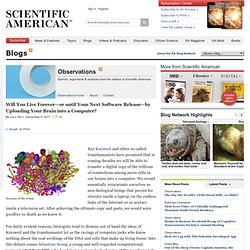

In just four generations, we’ve massively slashed human mortality. You know what?

Old age is not all it's cracked up to be. I'm only 56, but that's just 14 years away from how old my hero Dennis Ritchie was when he died. I'm thinking about buying a new car. Before the decision wasn't so serious, because I knew it was unlikely to be the last car I ever owned. But since my current car is 14 years old, it's entirely possible that my next purchase will in fact be my last.
Providing you can still think. I go to the gym several times a week, but I've given up trying to get the body back I had in my late 30s when I was into weightlifting and running 10K three times a week. My parents both passed away in the past six years. Then there's those damn kids on my lawn. Getting old still beats the alternative. Why getting physically stronger will help you live longer. Will You Live Forever—or until Your Next Software Release—by Uploading Your Brain into a Computer? Neurons of the retina Ray Kurzweil and other so-called transhumanists have promised that in coming decades we will be able to transfer a digital copy of the trillions of connections among nerve cells in our brains into a computer.

We would essentially reincarnate ourselves as non-biological beings that persist for eternity inside a laptop, on the endless links of the Internet or as avatars inside a television set. After achieving the ultimate copy and paste, we would wave goodbye to death as we know it. For fairly evident reasons, biologists tend to dismiss out of hand the ideas of Kurzweil and the transhumanist lot as the ravings of computer jocks who know nothing about the real workings of the DNA and cells that make up living tissue. Into this debate comes Sebastian Seung, a young and well-regarded computational neuroscientist from MIT, who has taken a serious look at some of the questions put forth by the transhumanists. Seung strikes a pose that mixes skepticism with fascination.
Biomaterials - The prolongation of the lifespan of rats by repeated oral administration of [60]fullerene. Abstract Countless studies showed that [60]fullerene (C60) and derivatives could have many potential biomedical applications.
![Biomaterials - The prolongation of the lifespan of rats by repeated oral administration of [60]fullerene](http://cdn.pearltrees.com/s/pic/th/prolongation-administration-30439035)
However, while several independent research groups showed that C60 has no acute or sub-acute toxicity in various experimental models, more than 25 years after its discovery the in vivo fate and the chronic effects of this fullerene remain unknown. If the potential of C60 and derivatives in the biomedical field have to be fulfilled these issues must be addressed. Here we show that oral administration of C60 dissolved in olive oil (0.8 mg/ml) at reiterated doses (1.7 mg/kg of body weight) to rats not only does not entail chronic toxicity but it almost doubles their lifespan. The effects of C60-olive oil solutions in an experimental model of CCl4 intoxication in rat strongly suggest that the effect on lifespan is mainly due to the attenuation of age-associated increases in oxidative stress. Keywords Fullerenes; Toxicity; Pharmacokinetics; Ageing; Oxidative stress.
Aubrey de Grey: A roadmap to end aging. Advancing Rejuvenation Biotechnologies.